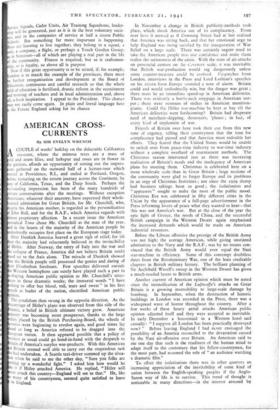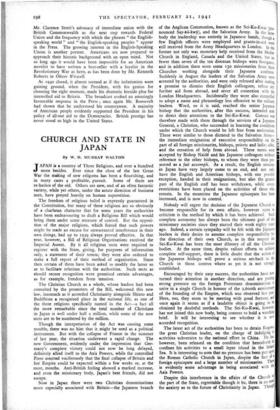AMERICAN CROSS- CURRENTS
By SIR EVELYN WRENCH
COUPLE of weeks' holiday on the delectable Californian sea-coast, where the mimosa trees are a mass of old and arum lilies, and larkspur and roses are in flower in gardens, affords an opportunity of sorting out the impres- ons gathered on the outward half of a lecture-tour which tarted at Providence, R.I., and ended at Portland, Oregon, fore restarting on the return journey across the Continent, by 'ay of California, Texas, and the Deep South. Perhaps the utstanding impression has been of the many hundreds of rivate conversations after the meetings. Without exception mericans, whatevet their ancestry, have expressed their whole- carted admiration for Great Britain, for Mr. Churchill, who, espite his American mother, is regarded as the personification f John Bull, and for the R.A.F., which America regards with most proprietary affection. In a recent issue the American riodical Time chose Mr. Churchill as the man of the year, d in the hearts of the majority of the American people he ndoubtedly occupies first place on the European stage today. After Dunkirk America heaved a great sigh of relief, for till n the majority had reluctantly believed in the invincibility f Hitler. After Norway, the entry of Italy into the war and e collapse of France, America did not believe Britain could and up to the Axis alone. The miracle of Dunkirk showed t the British people still possessed the genius and daring of or Elizabethan forebears. Few speeches delivered outside Western hemisphere can surely have played such a part in -shaping American public opinion as Mr. Churchill's utter- es in those dramatic weeks; the immortal words " I. have othing to offer but blood, toil, tears and sweat " in his first eech as leader of the nation, electrified American public pinion.
The pendulum then swung in the opposite direction. As the scarriage of Hitler's plans was observed from this side of the tlantic, a belief in British ultimate victory grew. American dustry was becoming more prosperous, thanks to the large rders placed by the British Purchasing-Board, the wheels of stories were beginning to revolve again, and good times lay ead so long as America refused to be dragged into the uropean vortex. It then appeared possible that a policy of usiness as usual could go hand-in-hand with the despatch to itain of America's surplus war-products. With this American d Britain seemed well able to carry out the stupendous task e had undertaken. A Seattle taxi-driver summed up the situa- on when he said to me the other day, " Sure you folks are utting up a wonderful fight" I asked him how would he e it if Hitler attacked America. He replied, "Hitler will ever attack this country—England will see to that." He, like manY of his countrymen, seemed quite satisfied to leave to England. In November a change in British publicity-methods took place, which shook America out of its complacency. From over here it seemed as if Downing Street had at last realised that America was sitting back, and that her emotional urge to help England was being satisfied by the inauguration of War Relief on a large scale. There was certainly urgent need to take the American people into our confidence and make them realise the seriousness of the crisis. With the start of air-attacks on provincial centres on the Coventry scale, it was inevitable that British war-production would sag dangerously unless some counter-measure could be evolved. Despatches from London, interviews in the Press and Lord Lothian's speeches on his return from Europe sounded a note of alarm. Britain could and would undoubtedly win, but the danger was great ; there must he an immediate speed-up in American deliveries. There was evidently a bottle-neck stoppage in American out- put ; there were rumours of strikes in American munition- plants. Could the Hitler war-machine be kept at bay till the American deliveries were forthcoming? Britain had desperate need of merchant-shipping, destroyers, 'planes ; in fact, of every kind of implement of war.
Friends of Britain over here took their cue from this new tone of urgency, telling their countrymen that the time for complacency had passed and that America must redouble her efforts. They feared that the United States would be unable to switch over from peace-time industry to war-time industry without a complete overhaul of rearmament methods. The Christmas season intervened just as there was increasing realisation of Britain's needs and the inadequacy of American plans for meeting them. Christmas is celebrated here on a more wholesale scale than in Great Britain ; large sections of the community were glad to forget Europe and its problems in an orgy of Christmas festivities ; not since the 1929 slump had business takings been so good ; the isolationists and " appeasers " sought to make the most of the public mood. Christmas Eve was celebrated in fifty different cities in the Union by the appearance of a full-page advertisement in the Press informing lovers of peace what they wanted to hear—that this was not America's war. But at the close of the year the epic fight of Greece, the needs of China, and the successful British campaign in the Western Desert again emphasised the increased demands which would be made on American industrial resources.
Before the Libyan offensive the prestige of the British Army was not high; the average American, while giving unstinted admiration to the Navy and the R.A.F., was by no means con- vinced that the British Army would ever equal the Nazi war-machine in efficiency. Some of this contempt doubtless dates from the Revolutionary War, one of the least creditable chapters in British military history. The brilliant planning of Sir Archibald Wavell's sweep in the Western Desert has given a much-needed lustre to British arms.
Another current of American opinion which must be noted since the intensification of the Luftwaffe's attacks on Great Britain is a growing insensibility to large-scale damage by bombing. In September, when the destruction of historic buildings in London was recorded in the Press, there was a widespread wave of horror throughout the country. After a few weeks of these heavy aerial attacks American public opinion adjusted itself and they were accepted as inevitable. In early December a housemaid in a Western hotel said casually: " I suppose all London has been practically destroyed now? " Before leaving England I had raver envisaged the possibility of an America reconciled to the devastation caused by the Nazi air-offensive over Britain. An American said to me one day that such is the readiness of the human mind to adapt itself to the customary that his fellow-countrymen, for the most part, had assumed the role of " an audience watching a dramatic film."
To offset the isolationism there was in other quarters an increasing appreciation of the inevitability of some kind of union between the English-speaking peoples if the Anglo- Saxon way of life is to survive. This trend of thought is noticeable in many directions—in the interest aroused by Mr. Clarence Streit's advocacy of immediate union with the British Commonwealth as the next step towards Federal Union and the frequency with which the phrases " the English- speaking world " and " the English-speaking peoples " appear in the Press. The growing interest in the English-Speaking Union is another portent. Americans are now prepared to approach their historic background with an open mind. Not so long ago it would have been impossible for an American novelist to have written a best-seller with a loyalist in the Revolutionary War as hero, as has been done by Mr. Kenneth Roberts in Oliver Wiswell.
As 1940 closed, it almost seemed as if the isolationists were gaining ground, when the President, with his genius for choosing the right moment, made his dramatic fireside plea for intensified aid to Britain. The broadcast evoked an amazingly favourable response in the Press ; once again Mr. Roosevelt had shown that he understood his countrymen. A majority of American people evidently supported the President in his policy of all-out aid to the Democracies. British prestige has never stood so high in the United States.































 Previous page
Previous page